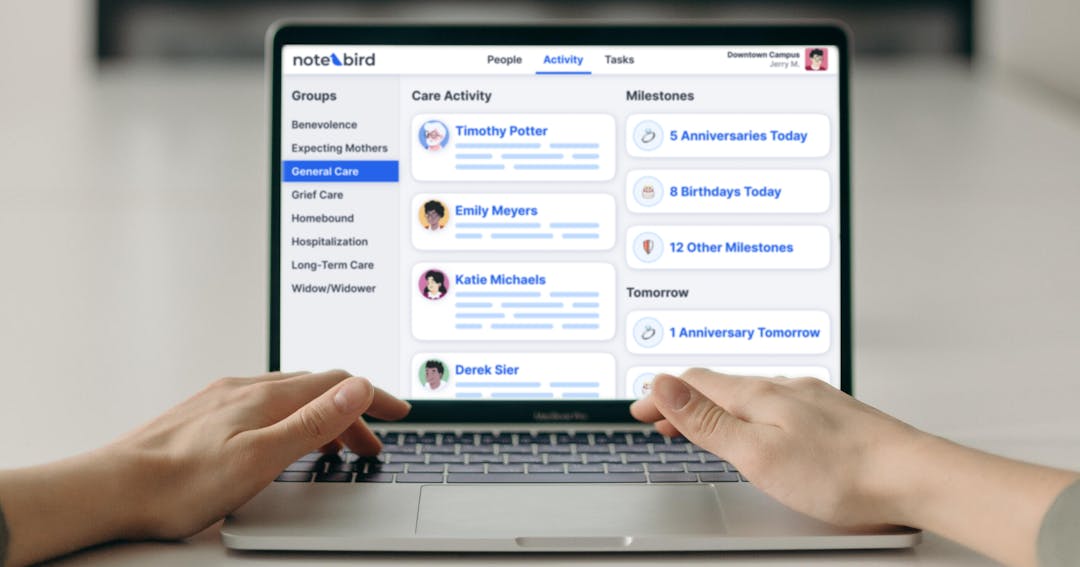
3 Reasons Your Calendar Isn't the Best Place to Store Important Pastoral Care Events
Calendars remind you of upcoming events, but lack the depth and context to inform impactful pastoral care.
The death of one person affects entire families and communities. It affects congregations and ministries. It affects everyday life. Pastor Rob O’Lynn contemplates the impact a single death can have in his book Practicing Presence:
“Death breaks in on a community like an echoing, ricocheting sound reminding us all of our finitude. It rearranges families. Ministry amid death is best understood, not just individualistically as care for a single person, but also interpersonally for the family, friends and wider community as well.”
Church leaders are intimately familiar with death and grief. It comes in different forms and affects people in vastly different ways. Death is a reminder of the fragility of life, but it is also a call to care for those who have lost a loved one. For those who choose to be leaders in the Church, there is a very real expectation and understanding that care for the grieving will be a present in every season of ministry.
The deep desire to care for the grieving is often met with three practical “how” questions:
- How do I track who has lost a loved one?
- How do I remember to follow-up?
- How do I keep the bereaved from falling through the cracks?
Pastors and church leaders take different approaches and create different systems for answering these “how”questions. Over the years, thousands of pastors have shared with us their systems for staying organized when it comes to caring for people in their congregations who have had loved ones pass away. From 3x5 cards to manila folders to spreadsheets — everyone has a system. Below is a list of the top ways we’ve heard pastors and their teams are managing grief care — and how those ways are failing them.
Memory
Things tend to happen quickly after a person passes away — extended family and community are notified, home visitations are made, food is delivered and funeral arrangements are solidified. Pastors are called in for certain moments throughout the process. These logistics and requests oftentimes are handled through email, text and phone calls. Pastors use their memory to handle care in the moment. This works for many pastors, especially those who are extremely relational. They play such an important and impactful role in the lives of the family and broader grieving community.
Why You’re Drawing a Blank
What we hear from pastors and care teams is that, in the weeks and months following a funeral, people begin to fall through the cracks. Those who have experience with the bereaved know this time period is critical in terms of support needs. Without proper note keeping and a system for following up, it becomes extremely challenging to remember the exact date of the passing and when the last follow-up touchpoint happened. Because of this, many teams find that the next logical step is to turn to the calendar.
Calendars
Pastor Nancy Q. summed up what we hear all the time from pastors: “I used my memory until my memory seemed to start failing me.” Google, Outlook or other digital calendar options are easy to turn to, because they are typically already being used for other purposes, are fairly straightforward and easily accessible. Leaders will create an annual calendar event for the death of a loved one — but, as we will discuss, this leaves out many important steps in the grief care process.
Why Your Calendar Doesn’t Cut It
Calendars have been around for ages and certainly serve a purpose, but they can hardly keep up with the complexities that come with managing pastoral care for a group, a congregation or multiple congregations. Here are our top reasons why pastoral care teams need more than just a calendar to provide effective care:
Reason 1: The entire team can’t see it.
While your calendar can certainly keep track of important dates, it is stored in one place. You can invite other members of the team to an event, or even to a calendar, but there is quite a bit of upkeep to this method, and it also becomes difficult to keep track of who has access to potentially sensitive information.
Reason 2: Your care data is inaccessible.
While you may have a calendar full of important dates, there is no way to collate this information into a useful format. All of the information you have stored is a treasure trove of important metrics about the congregation, but you can’t run a report or easily obtain a list of all the names in your calendar events or recurring reminders.
Reason 3: Pastors take their calendar with them.
When a pastor leaves, many times that calendar walks out with them. This leaves care teams and their new pastor to start from scratch. Many of these important dates may never be recovered, and congregants may feel forgotten.
Reason 4: There is no care history.
For reasons of security or simply because it isn’t suitable, teams typically don’t store details of a passing in a calendar. This limits the written record to something like, “Ms. Jones passed away.” Pastors and care teams are left with no context and no care history of the situation. The details of a passing and of the bereaved person’s journey through it are essential to making that congregant feel cared for.
Spreadsheets
Pastors and pastoral care teams often turn to spreadsheets as a means to track and manage various aspects of pastoral care within their congregations. While initially seeming like a convenient solution, relying solely on spreadsheets can prove to be inadequate and challenging over time. As the volume of pastoral care interactions increases, spreadsheets can become cumbersome and difficult to maintain accurately.
Why You Should Ditch the Spreadsheets
Updating and cross-referencing information across multiple spreadsheets can lead to errors, data duplication, and version control issues. Additionally, spreadsheets may lack features tailored to specific pastoral care needs, making it challenging to track complex situations and holistic care plans effectively. As a result, important details about congregants and their needs might be overlooked or lost, hindering pastors and care teams from providing comprehensive and timely support. In this digital age, exploring purpose-built software solutions or dedicated database systems designed explicitly for pastoral care can alleviate these challenges, allowing pastors and care teams to streamline their efforts, enhance collaboration, and deliver more personalized and effective care to their community.

Notebird
Notebird is easy-to-use, dedicated pastoral care software for church leaders and their teams. With Notebird, pastoral care teams can store Updates, or notes about visits with congregants, allowing teams to work together to create a detailed care history. Teams can also note important Milestones and set up recurring reminders for customizable events like birthdays, death anniversaries, marriage anniversaries and more. Administrators can also set and assign Tasks to themselves and to team members. Teams can choose to sort congregants into customizable Groups and restrict access to information using Notebird’s flexible permission settings. Information appears on congregant profiles and also in a feed format so everyone on the team stays up to date. Finally, care teams can use Notebird’s Reports feature to assess their care data and gain important insights into the impact their work is having collectively. All of these features combine to ensure pastors and care teams can provide the best care possible to their people. See why care teams are switching to Notebird - visit Notebird.app and start your 14-day free trial today!
